Cart abandonment is the ultimate enemy of online stores, and nobody knows that better than us at OptinMonster.
For over a decade, we’ve helped customers reduce cart abandonment, improve conversion rates, and turn website traffic into revenue.
In this article, I’ve summarized all that experience to help you understand cart abandonment, why it happens, how to prevent it, and how to recover lost sales effectively.
If you’d like to skip ahead and find out how to reduce cart abandonment, jump to the list below!
Want to Reduce Cart Abandonment Fast? Try OptinMonster!
OptinMonster is packed with powerful features like exit-intent popups, timed offers, and targeted discounts that help capture attention right before customers leave.
By presenting personalized incentives at the perfect moment, OptinMonster helps convert hesitant shoppers into loyal buyers, boosting your sales and reducing lost revenue.
- Offer Incentives With Exit-Intent® Popups
- Make Your Checkout Process Easy
- Be Upfront With Your Cost Total
- Offer Free Shipping
- Provide Fast Shipping Options
- Highlight Easy Returns & Money-Back Guarantees
- Re-Engage With InactivitySensor™ Popups
- Convince Shoppers With Social Proof
- Make Saving Carts Easy
- Show Security Seals
- Answer Questions
- Optimize with A/B Testing
What Is Cart Abandonment?
Cart abandonment occurs when a customer adds items to their online shopping cart but leaves the website without completing the purchase. Essentially, they “abandon” their cart.
This is a common issue in eCommerce, with high abandonment rates often reported. It can significantly impact a business’s bottom line.
What Is Cart Abandonment Rate?
The cart abandonment rate is the percentage of online shoppers who add items to their virtual shopping cart but then leave the website without completing the purchase.
Essentially, it measures how many potential customers show interest in a product (by adding it to their cart) but ultimately don’t buy it.
What Is the Average Cart Abandonment Rate?
The average cart abandonment rate is around 69.99% according to the Baymard Institute. This means that nearly 7 out of 10 customers who add items to their cart don’t complete the purchase.
It’s important to note that this is an average and the actual rate can vary significantly depending on the industry, specific products, and other factors.
How to Calculate Cart Abandonment Rate
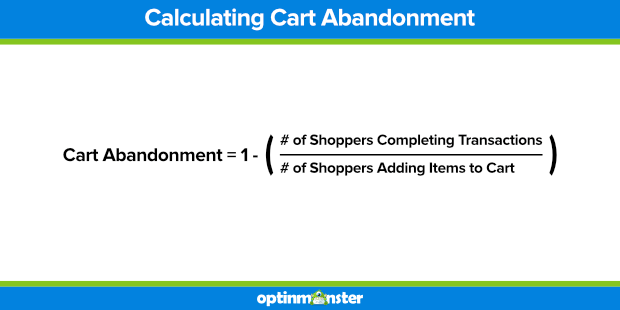
Here are the steps:
- Choose a period of time, such as a 1 calendar year. Divide your number of completed purchases during that time by the number of carts created on your site.
- Subtract that number from 1.
- Multiply by 100 to get your cart abandonment percentage.
For instance, let’s say your online store has had 3,488 completed purchases, but you’ve had a total of 12,132 carts created. You would take these steps to calculate your abandonment rate:
- 3,488/12,132 = 0.288
- 1 – 0.288 = 0.712
- .0.712 x 100 = 71.2%
In this case, the shopping cart abandonment rate would be 71.2%.
Reasons Behind Cart Abandonment
1. Unexpected Costs: Additional costs, such as shipping fees, taxes, or hidden charges, can come as a surprise to customers during the checkout process. High or unclear shipping costs are often cited as one of the primary reasons for cart abandonment.
2. Complicated Checkout Process: Lengthy and complex checkout processes can frustrate customers and lead to abandonment. Requiring too much information, multiple checkout form fields or complicated navigation can create unnecessary friction.
3. Distractions and Interruptions: Customers may get distracted by external factors while shopping online. They might receive a phone call, get interrupted by a family member, or be lured away by another task or website, causing them to leave the cart behind.
4. Comparison Shopping: Customers often engage in comparison shopping, especially for higher-priced items. They might add items to their cart on one website but then abandon it to check prices, read reviews, or compare options on other websites.
5. Unexpected Checkout Requirements: Requiring customers to create an account before completing a purchase can be a barrier. First-time buyers may not want to invest time in creating an account or may have concerns about data privacy and security.
6. Lack of Trust: If a website appears unprofessional, has a poor design, or lacks social proof such as customer reviews or testimonials, first-time visitors may hesitate to proceed with the purchase, leading to cart abandonment.
7. Technical Issues: Technical glitches, slow-loading pages, or website errors can frustrate customers and prompt them to abandon their carts out of sheer inconvenience.
How to Reduce Cart Abandonment
In order to lower your cart abandonment rates, you’ll need to find ways to convince more online shoppers to complete their purchases before leaving your site.
Thankfully, I’ve got some great tips for doing just that.
1. Offer Incentives With Exit-Intent Popups
One of the best ways you can reduce shopping cart abandonment is to create a popup that uses OptinMonster’s Exit-Intent® Technology.
An exit-intent popup will display your message when a user is actively leaving your checkout page. This means you can capture your user’s attention at the exact moment they plan to abandon their carts.
You can use your popup to offer an incentive for customers to complete their purchase, such as a coupon or discount codes, free shipping, or a free gift with purchase.
Here’s an example of an exit popup we use here at OptinMonster:
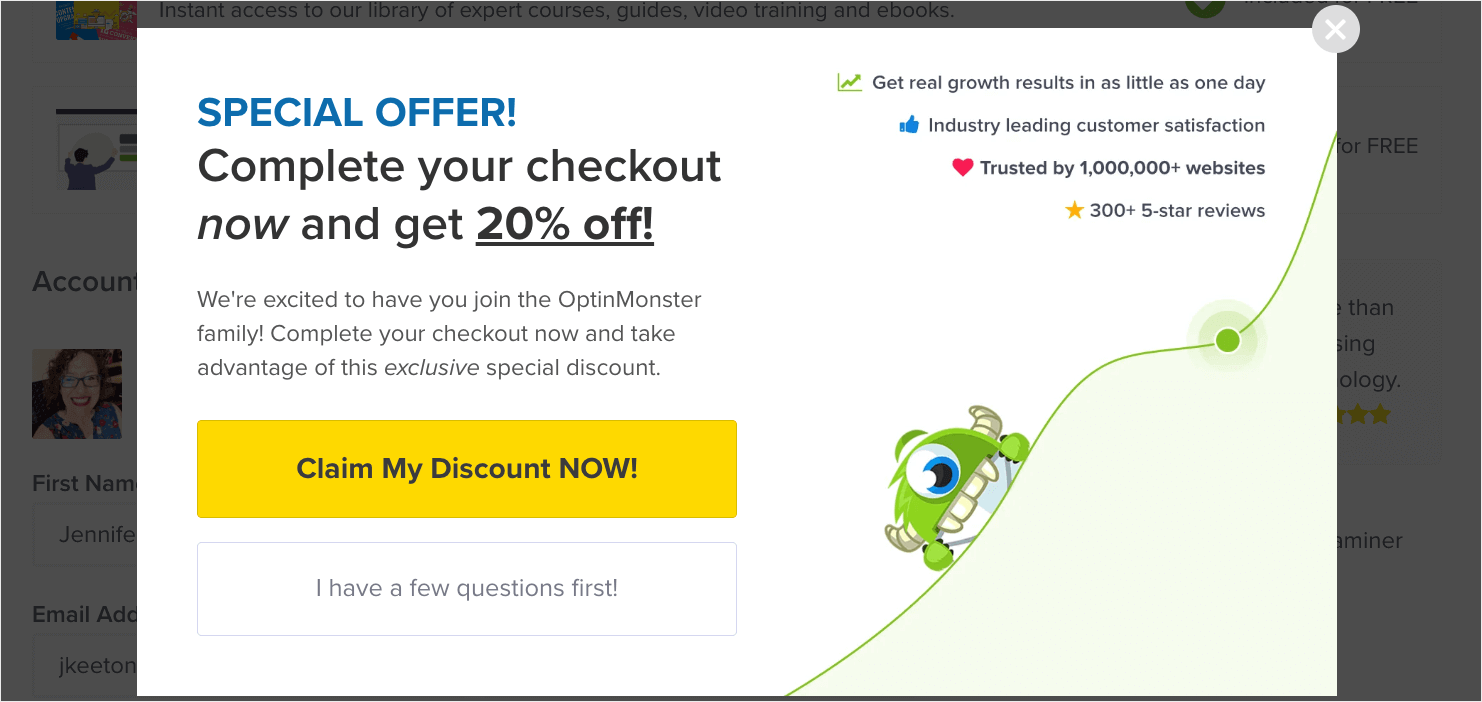
With our exit popup, we offer an exclusive discount and remind visitors of some of the benefits of our lead generation software.
By interacting with your online shoppers at this critical moment in their customer journey, you can motivate hesitant customers to go through with their purchase.
In fact, Shockbyte attributes 52% of its revenue to OptinMonster’s exit-intent campaigns, which reduce their site’s cart abandonment. Here’s an example of one of their popups:
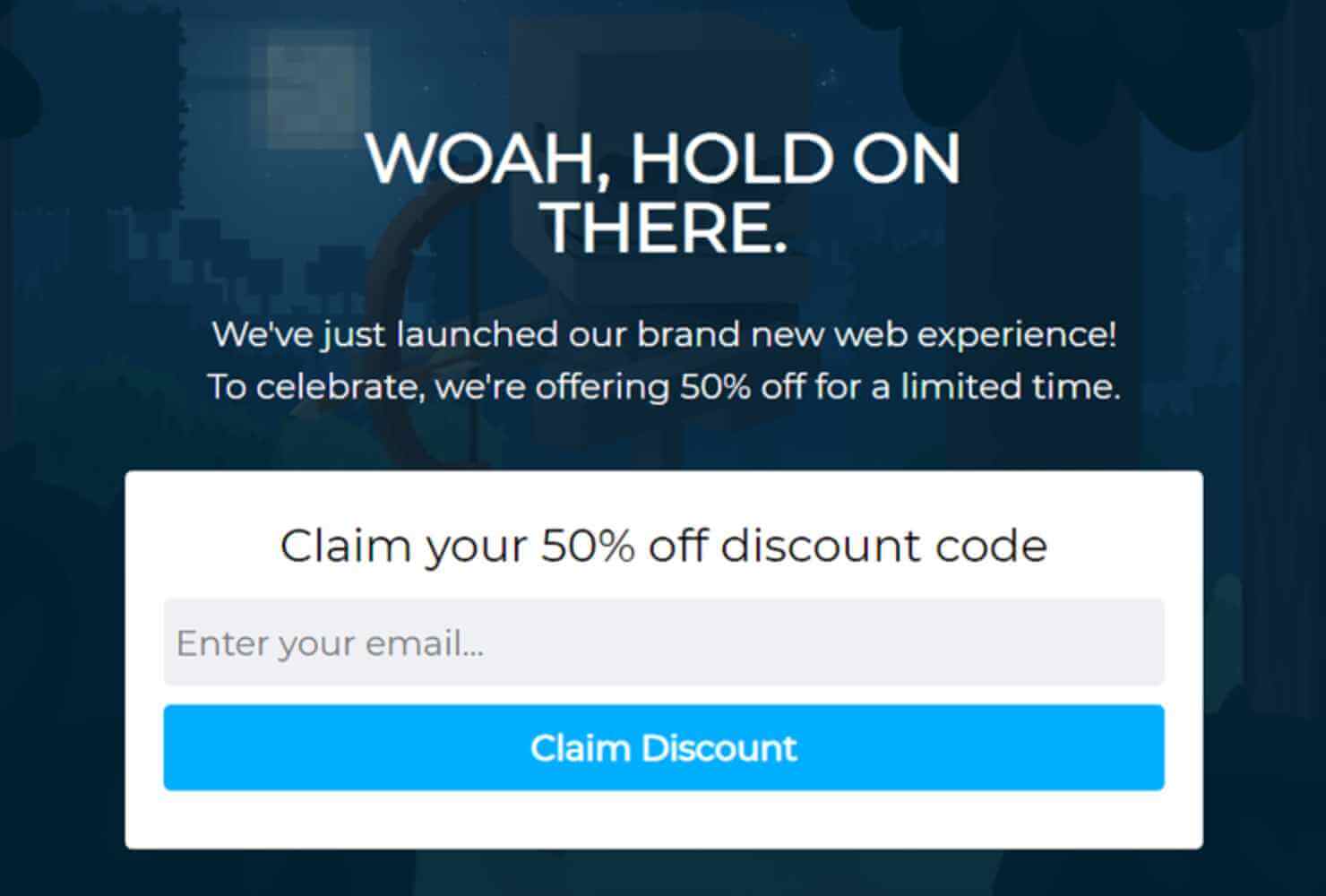
With OptinMonster’s robust targeting and triggering features, you can show your cart abandonment offers to the right people at the right time. Here’s a popular combination of our display rules that works great for abandoned cart popups:
- Exit-Intent Technology: Target visitors who are about to leave your site. It even works on mobile!
- Page-Level Targeting: Show your best offers to shoppers who exit from your checkout or cart pages.
This is a particularly good strategy for eCommerce stores with a lot of window shoppers. An exit-intent popup can take casual browsers and convert them into lifelong customers. When you include a coupon in your exit popup, you can also convert potential customers who wanted to wait on a sale or were discouraged by high shipping costs.
2. Make Your Checkout Process Easy
Since checkout complications are a top reason for cart abandonment, you should strive to make the process as easy as possible. Baymard Institute used 10 years of data to conclude that “the average large-sized e-commerce site can gain a 35.26% increase in conversion rate through better checkout design.”
Here are a few steps you can take to improve your website’s UX and your checkout process:
- Optimize the load times and overall performance of your site.
- Allow a guest checkout option, so shoppers don’t have to create an account before they buy.
- Offer multiple payment options, such as Apple Pay, Paypal, or Amazon Pay. If a customer already uses one of these payment methods, then they can check out without having to enter their credit card details.
In order to improve your checkout process, you first need to understand your customers’ pain points. To learn how to do that, check out our post, Best Ways to Collect Customer Feedback on Your Website. It will show you how to gather information related to customer experience.
3. Be Upfront With Your Cost Total
Shipping and service fees are expected costs in shopping online. However, it’s important to make sure your customers know the total price as soon as possible.
Have you ever been blindsided with extra fees just as you were about to complete an online purchase? Did the frustration cause you to abandon that purchase? Not only that, but did you lose trust in the integrity of the company?
If possible, you should always make your shipping costs and fees visible on your product pages.
Sometimes, however, that’s just not possible. For instance, you may have to collect some customer information, such as a shipping address, before the total price can be calculated. If that’s the case, collect that information early in the checkout process. That way, you can provide the actual total before the customer has completed too many steps.
This strategy will help you avoid losing sales due to last-minute sticker shock.
4. Offer Free Shipping
Another way to overcome price objections is to offer free shipping promotions. With free shipping, you avoid the risk of losing customers due to additional costs during checkout. And if a customer is expecting to pay for shipping, then a free shipping offer can be just as exciting as a discount.
If you’re offering free shipping, make sure your website visitors know about it! Here are a few ways to promote your offer:
- Add “Free Shipping” beside or below the price on any product that qualifies.
- Announce your free shipping offer in a floating bar at the top of your website
- Include an exclusive free shipping code in your exit-intent popup on your checkout pages.
Bonus Tip: You can require a minimum order total for free shipping as a way to upsell. According to Shippo’s 2023 The State of Shipping report, 47% of consumers say they’re willing to spend a minimum amount in order to get free shipping.
Here’s an example from Cosmetic Capital. They used this OptinMonster floating bar to inform shoppers that they were offering free shipping on orders over $55. They also included a Countdown Timer to create a sense of urgency.

Not only did this floating bar encourage people to buy, but Cosmetic Capital used this campaign to add over 18,000 new leads to their email marketing subscriber list.
5. Provide Fast Shipping Options
Another common reason for cart abandonment is delivery time. According to Shippo, 52% of customers want to get their items in 2-3 days.
While free shipping is a huge incentive, you should also offer fast shipping, even if you have to charge for it. Here’s an example of a shipping table on a checkout page from Land’s End:
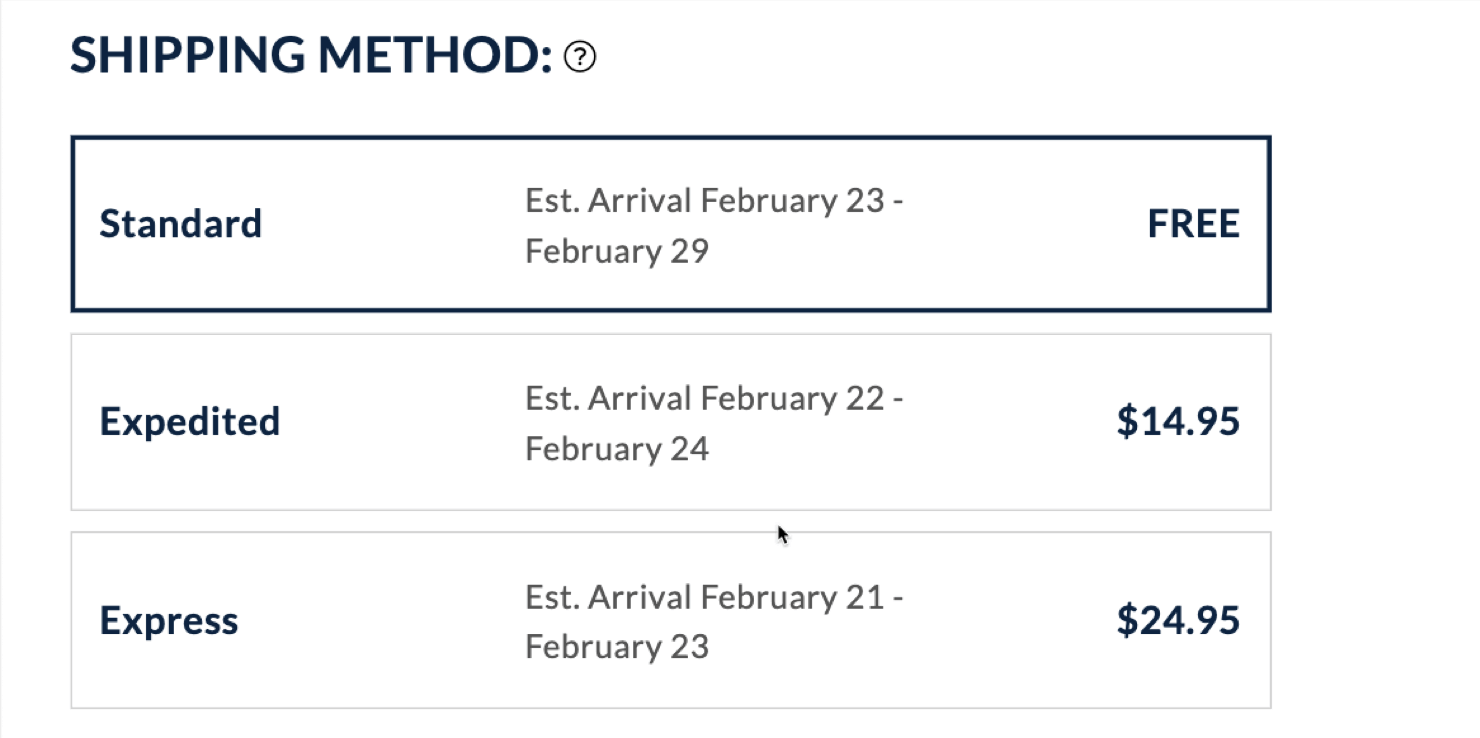
If a customer really needs their order by a certain date, they may be willing to pay the premium instead of abandoning their cart.
6. Highlight Easy Returns & Money-Back Guarantees
Even when you have a great product and a compelling value proposition, shoppers still may second-guess whether they should complete their purchase. That’s why you should ease fears by prominently featuring your return policy.
For physical products, make your return policy simple and clear. Also, let customers know if they can drop off their returns at a physical location.
For software and services, a money-back guarantee can make shoppers feel more confident about clicking “Buy Now.”
At OptinMonster, our pricing page features a letter from our co-founder Thomas Griffin. It explains the details of our unconditional 14-day money-back guarantee.
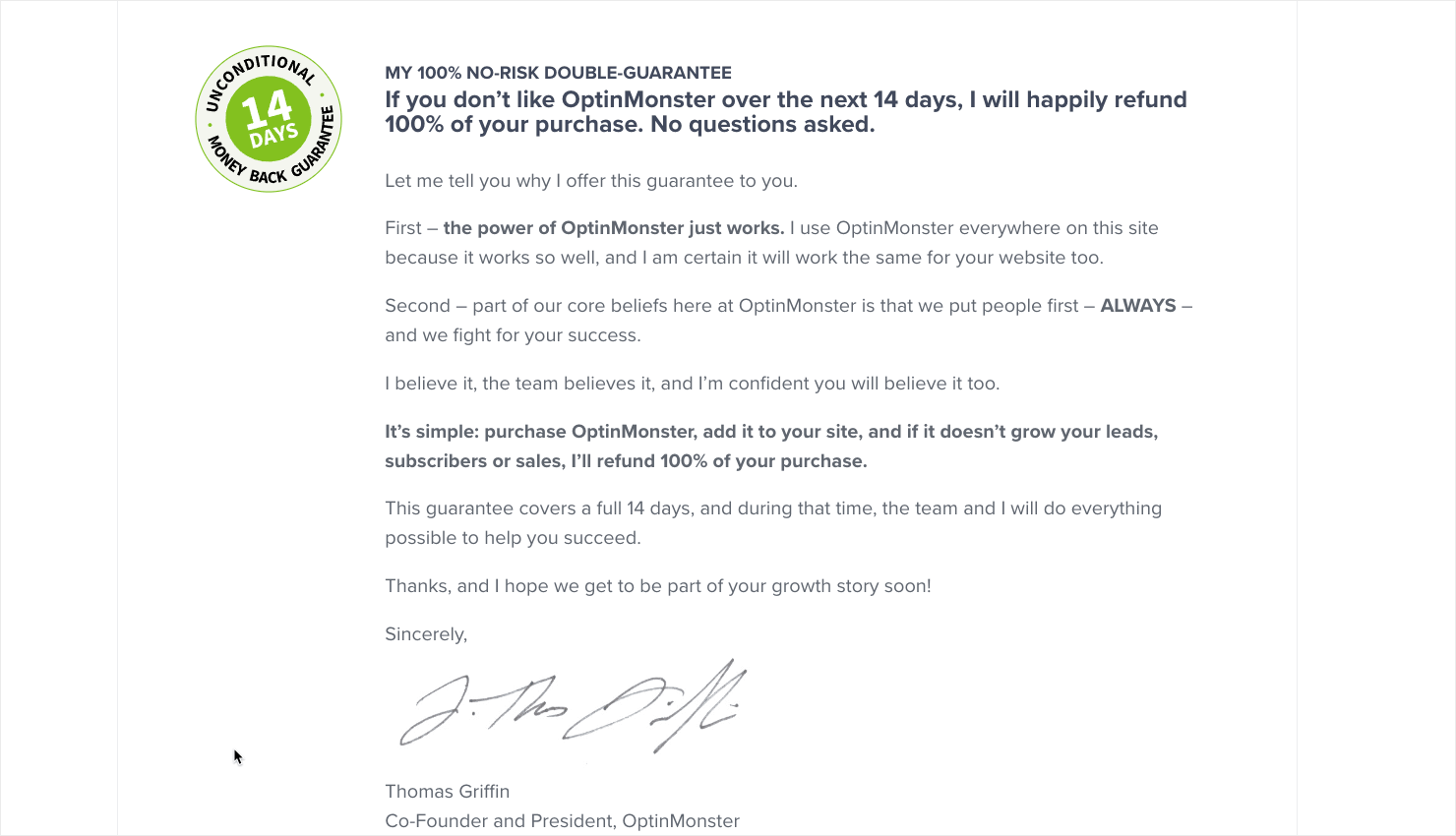
7. Re-Engage With InactivitySensor™ Popups
The world of eCommerce can be difficult to navigate. With millions of websites fighting for your attention every day, it’s easy for consumers to get distracted.
Let’s say your customer just loaded their shopping cart with a few of your products. Then, they get a push notification from Google Calendar, reminding them about a meeting later that afternoon.
While checking the details of the meeting, they see a Facebook message notification. A friend has sent them a link to an article they want to read.
Before they know it, they’ve completely forgotten about the purchase they were about to make.
It’s easy for consumers to lose focus while they’re shopping online. Your goal as the business owner is to refocus their attention and make sure your customers get the products they want.
The best way to do this is with OptinMonster’s InactivitySensor™. This trigger will display your popup or campaign after a user has stopped engaging with their browser page for a certain amount of time.
And just like with exit-intent popups, you can sweeten the deal with a coupon code or discount.
Just check out this straightforward OptinMonster campaign that Skate.co.uk used to re-engage inactive mobile visitors.
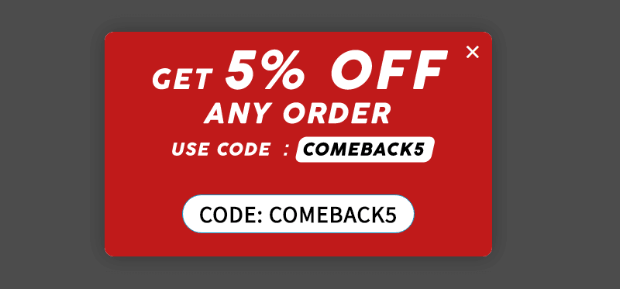
They combined 2 display rules for this campaign:
- Page-Level Targeting to target users who were viewing cart or checkout pages
- InactivitySensor™ to show the popup when a user had been inactive for at least 25 seconds
This popup saw a 6.29% conversion rate. With a single on-site campaign, Skate.co.uk was able to win back shoppers who otherwise may have never visited their site again.
In a matter of minutes, you can build a similar popup to re-engage your users and reduce shopping cart abandonment.
8. Convince Shoppers With Social Proof
Want to convince uncertain shoppers to complete their checkout? Show them that other people have chosen your product and are thrilled that they did.
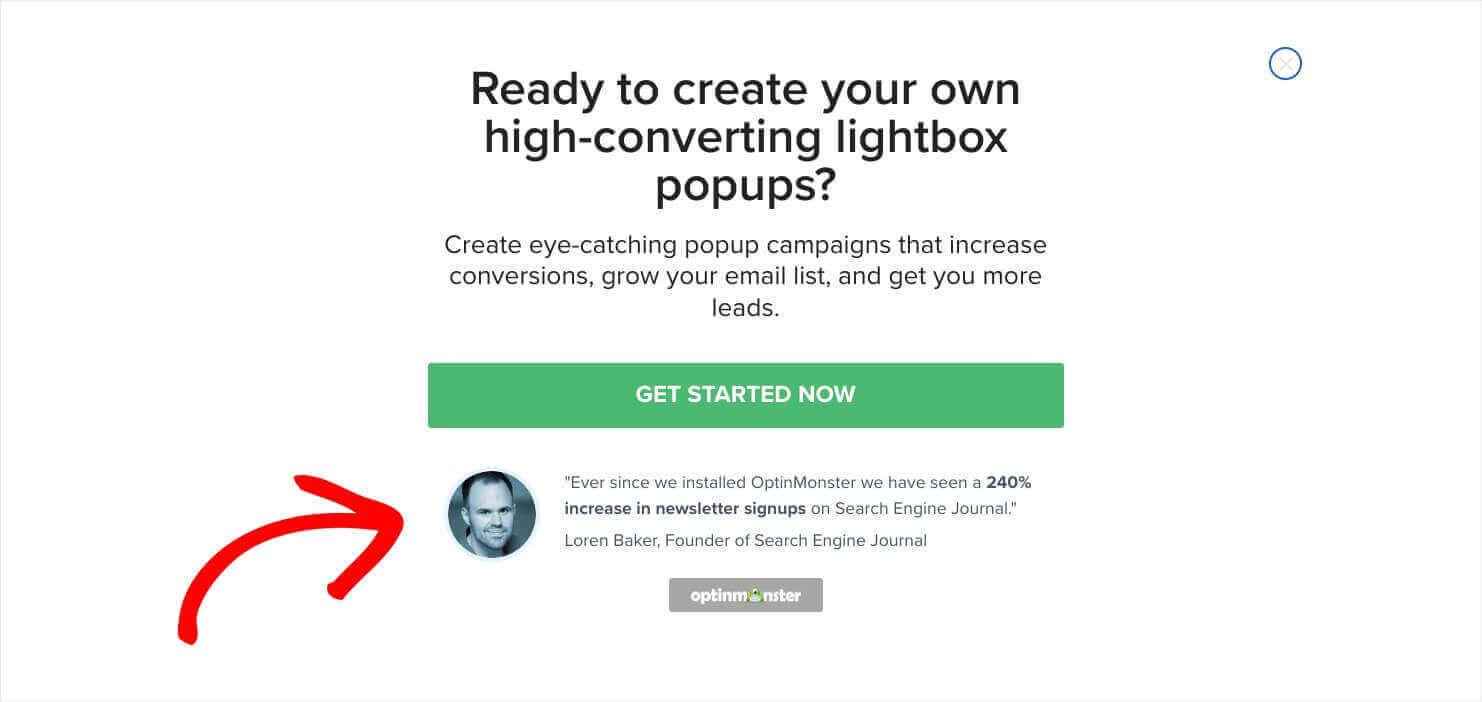
This tactic is called social proof, and it’s an excellent way to prevent shoppers from abandoning their online carts.
Here are a few ways to use social proof to build trust and reduce abandonment:
- Include customer testimonials throughout your website, including in your exit-intent and re-engagement popups.
- Feature customer reviews and star ratings on your product pages.
- Display real-time updates on purchases being made.
For that last tip, TrustPulse is the best tool available.
TrustPulse lets you build social proof notifications in a matter of minutes with zero coding skills required. Here’s a live sales notification that was created in under 5 minutes:

These notifications pop up in the corner of the browser, so website visitors can see your products’ popularity without having their shopping interrupted.
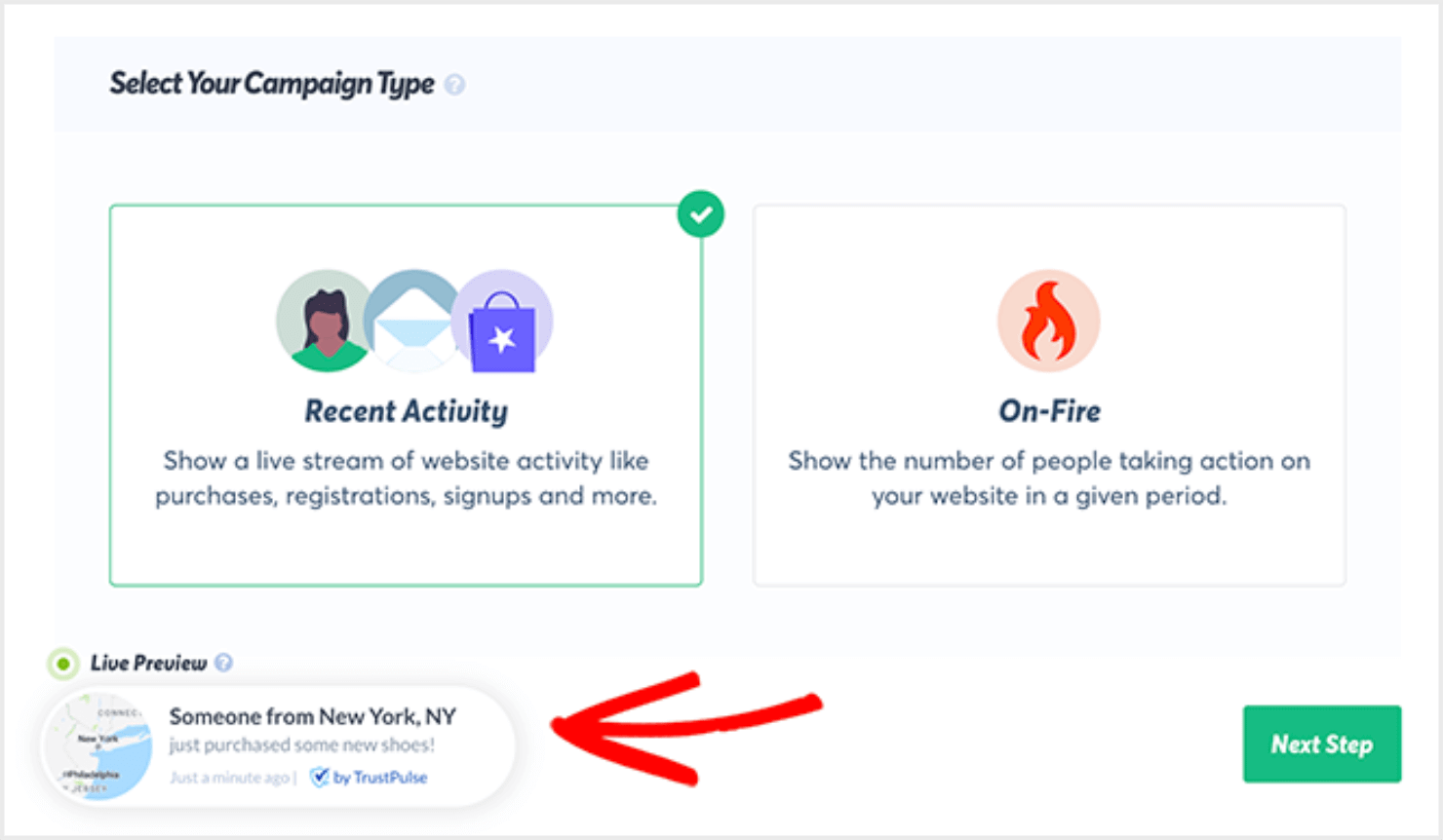
Everything about these messages can be modified to fit your brand’s style, voice, and message.
Want to give it a try? Get started with TrustPulse today!
9. Make Saving Carts Easy
Allowing your shopper to save their cart makes it easy for them to come back later to finish their purchase.
There are several ways to make that possible:
- Cart Saver: this Shopify app lets your customers easily save carts before checkout
- Free Persistent Cart App: with this Shopify tool your customers can save their carts and access it across devices
- WooCommerce Abandoned Cart Recovery: automatically saves carts
For more, check out this article: 12 Cart Saver Tools You Can Use for a Big Boost to Your Bottom Line
10. Show Security Seals
Are you sure your customers trust you?
According to research on cart abandonment, 29% of people mention security as the key reason they leave a site before submitting a form.
It’s up to you to show people their data is safe and protected.
Add well-known security seals like Norton and McAfee to your checkout cart page to signal your customer that your site is secure.
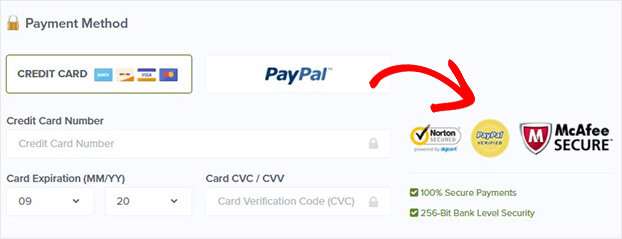
Blue Fountain Media increased conversions by 42%, just by adding a Verisign trust seal.
11. Answer Questions
Shoppers who can’t find the answers they’re looking for will abandon their cart.
Adding live chat to your site means your customers can quickly get the answers they need.
LiveChat is a popular live chat software that connects with shopping cart platforms like WooCommerce and Shopify.
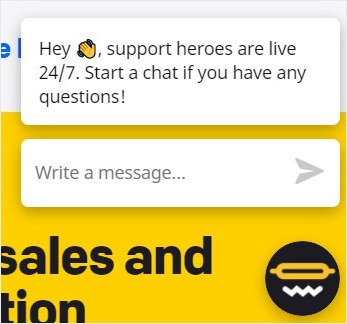
Check out this article for the best live chat plugins.
12. Optimize With A/B Testing
So you’re ready to start adding popups, special offers, and social proof to reduce your shopping cart abandonment rate. But what are the best words to use? The best design choices?
That’s where A/B testing, also known as split testing, comes in.
Split tests let you show multiple variations of a campaign or webpage to different website visitors. Then you can adopt the variation that performed best during your test.
When it comes to your OptinMonster popups, split testing is simple. In fact, it’s built directly into our Campaign Dashboard.
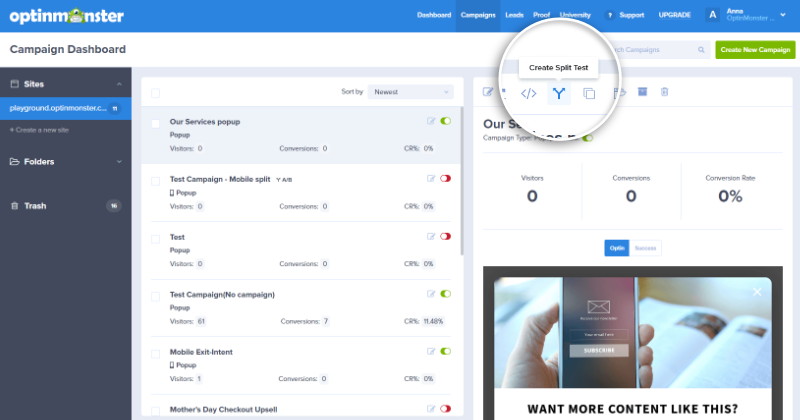
You can use split tests to determine which offers, headlines, colors, and calls-to-action (CTAs) get the best conversion rates.
Want to see just how easy split tests are in OptinMonster? Just watch this video:
Abandoned Cart Recovery
Of course, even with all these strategies to reduce cart abandonment, many shoppers will still inevitably leave your site without completing the checkout process.
Instead of seeing those abandoned carts as lost sales, treat them as promising leads.
Next, I’ll show you a few of the best ways to convert those abandoned carts into completed sales.
1. Send Abandoned Cart Emails
Anytime a registered user leaves items in their cart, they should receive a reminder email.
According to Klaviyo’s email marketing data for 2023, abandoned cart email campaigns have a phenomenal open rate of 53.57%.
It’s not too surprising if you think about it. If those “just browsing” shoppers added items to their cart so they wouldn’t forget about them, then they’ll be happy to get reminders about those products.
Klaviyo’s study also shows that businesses get an average revenue of $3.45 per recipient of their cart abandonment emails.
Want to learn more? Here are a few resources to help:
- How to Create an Abandoned Cart Email Strategy That Skyrockets Sales
- 14 Abandoned Cart Email Examples Proven to Boost Revenue
- 27 Abandoned Cart Email Subject Lines PROVEN to Convert
2. Send “Sale in Your Cart” Emails
What if that original reminder email doesn’t work? The next step is to send a follow-up email when there’s a price or stock change.
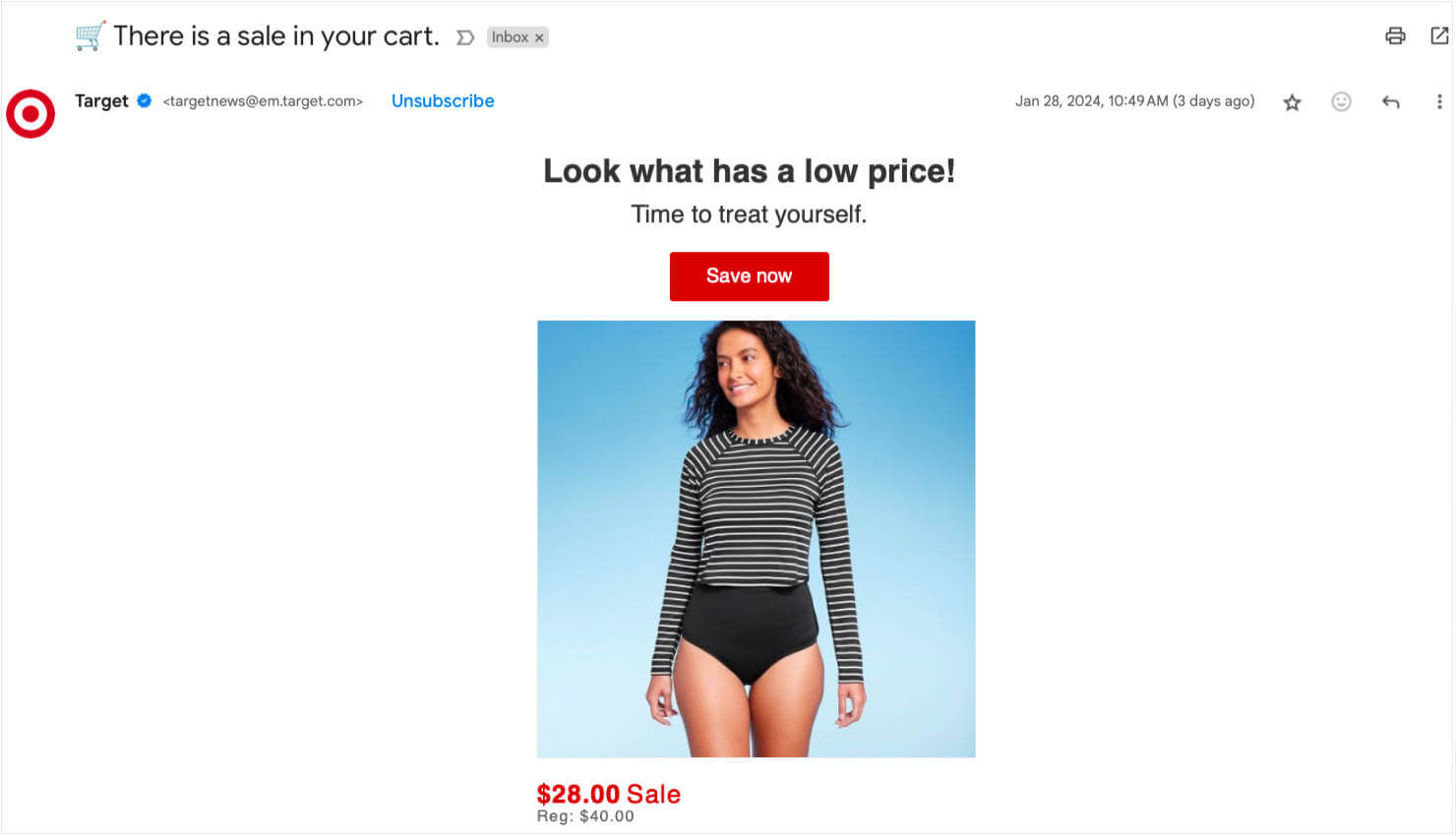
“Sale in cart” emails are a great way to convert online shoppers who liked your product but were hoping for a lower price.
Additionally, you can send “Last Chance” emails whenever cart items are low in stock.
3. Keep Nurturing Leads Through Retargeting
A website visitor has added some items to their cart. They saw your exit-intent popup with a special offer, but they closed your website anyway. You sent them email reminders about their cart items, but they didn’t open them.
Is this the end? It doesn’t have to be!
Instead, you can employ retargeting strategies. In marketing, retargeting lets you continue reaching out to previous website visitors. And you can craft those marketing messages based on the user’s previous behavior.
In fact, the email strategies I discussed in the last 2 tips show a simple example of retargeting:
You send a reminder email to users who have abandoned their cart. If that email doesn’t convert into a sale, you retarget that user by following up with a better offer, such as a sale or coupon code.
But there’s another easy way to use retargeting to recover abandoned carts:
Onsite Retargeting® With OptinMonster
Let’s say you have an exit-intent popup on your checkout page that offers a 15% discount. That popup will convince some of your visitors to follow through on their purchase.
For those visitors who don’t convert, you can retarget them with a different campaign the next time they visit your site.
Since the 15% discount didn’t work, you can sweeten the deal by upping the offer to 25% or by adding free shipping.
OptinMonster’s Onsite Retargeting® rules let you target your campaigns based on how a returning visitor interacted with a previous popup.
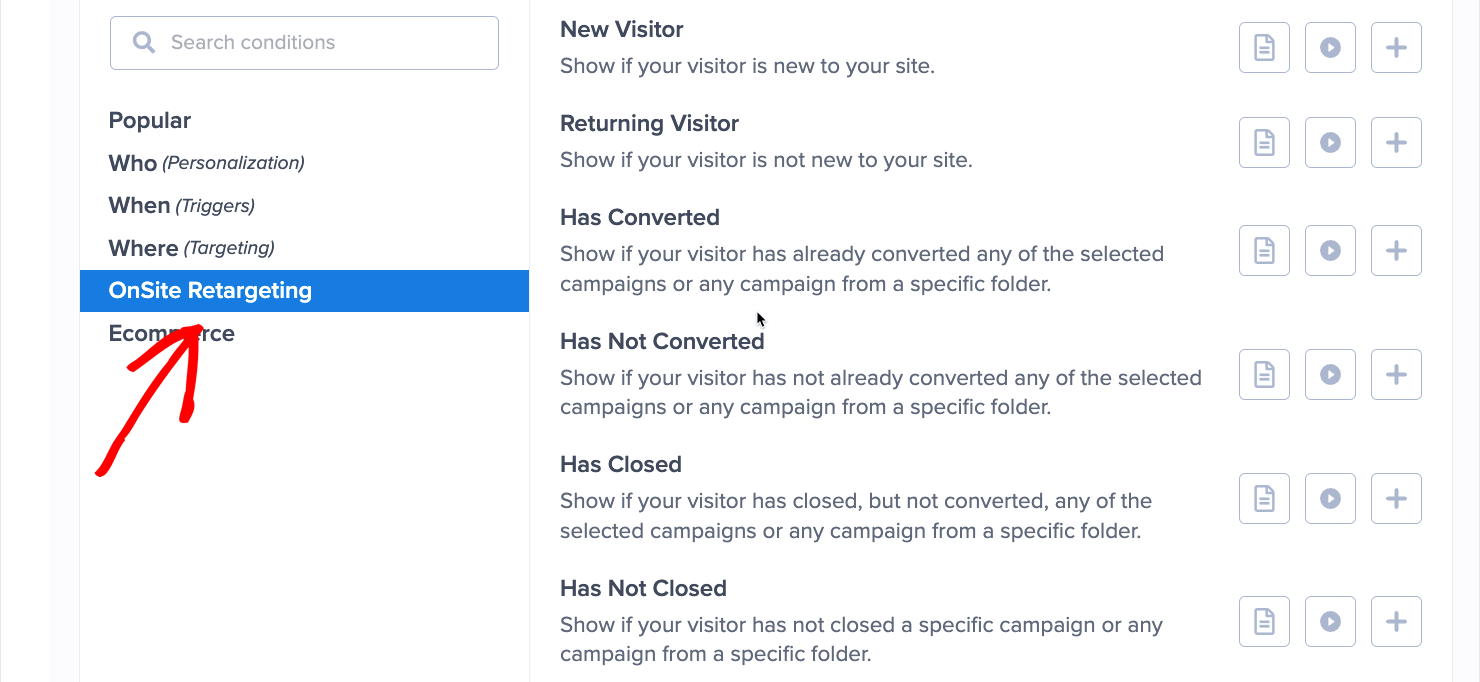
For instance, you could show a floating bar just to visitors who closed a previous campaign without converting. That floating bar can feature a free shipping code or another special offer.
Just like you can create automated workflows for your email marketing, you can do the same for your onsite popups, floating bars, and other OptinMonster campaigns.
Turned Abandoned Carts Into Sales
And that’s it! I hope you enjoyed this guide to shopping cart abandonment. If you did, you might want to check out these other helpful articles:
- How to Recover Abandoned Carts and Skyrocket Sales
- 9+ Cart Abandonment Stats to Help You Improve Your Cart Abandonment Rate
- Win-Back Emails: The Ultimate Guide to Re-Engaging Lapsed Customers
- How to Prevent Shopify Cart Abandonment
- Shopify Abandoned Cart Recovery: How To Boost Sales 40% Or More
- 8 Best Cart Abandonment Software and Solutions
And don’t forget that OptinMonster can help you stop abandoning visitors in their tracks! Our onsite marketing campaigns let you show the right offers to the right people at the right time.

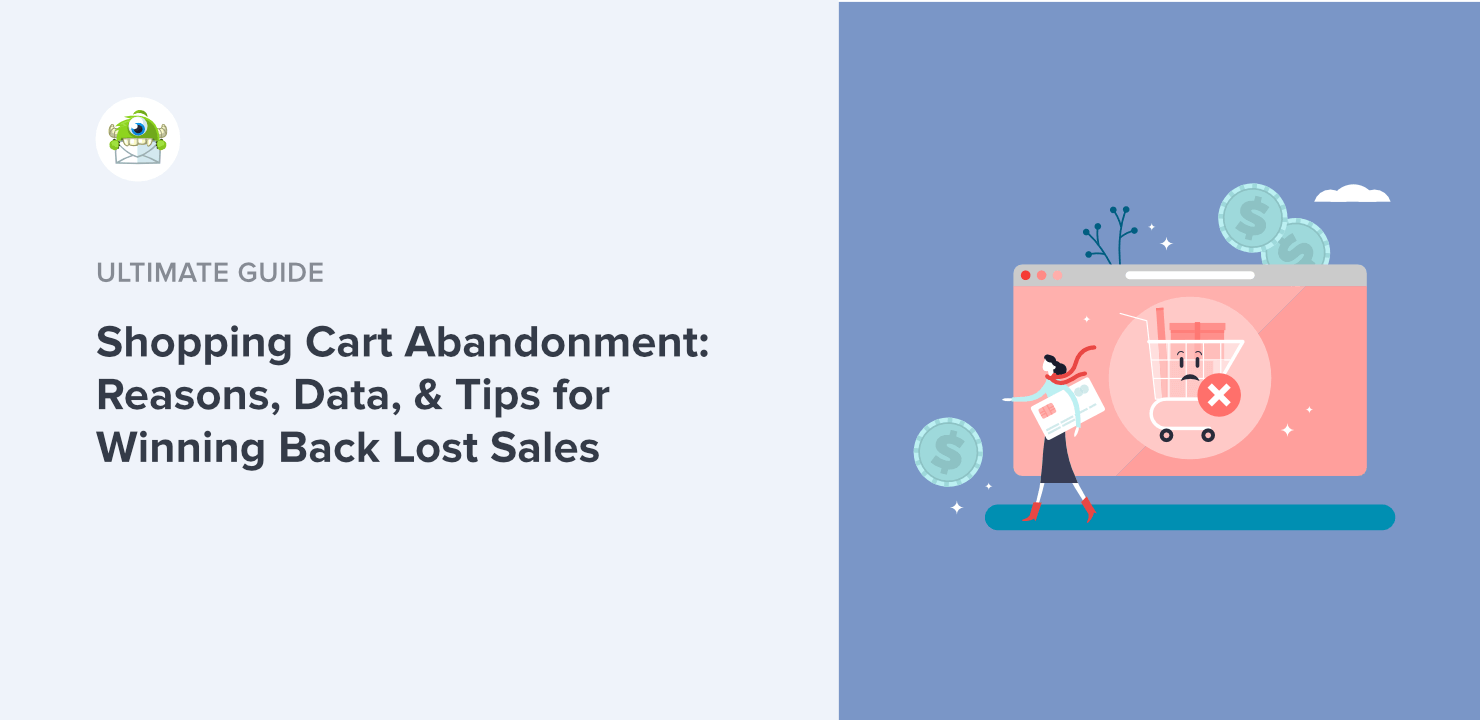
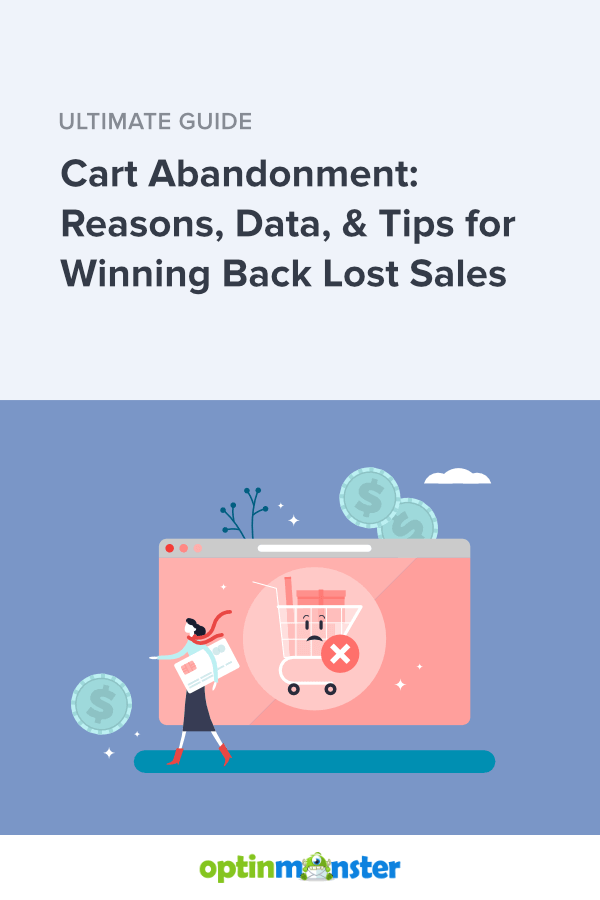





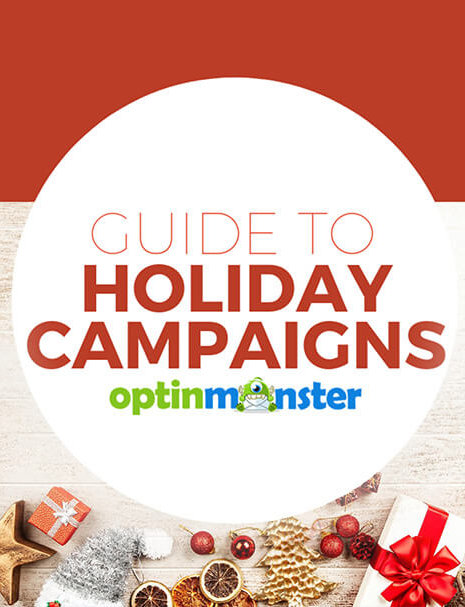
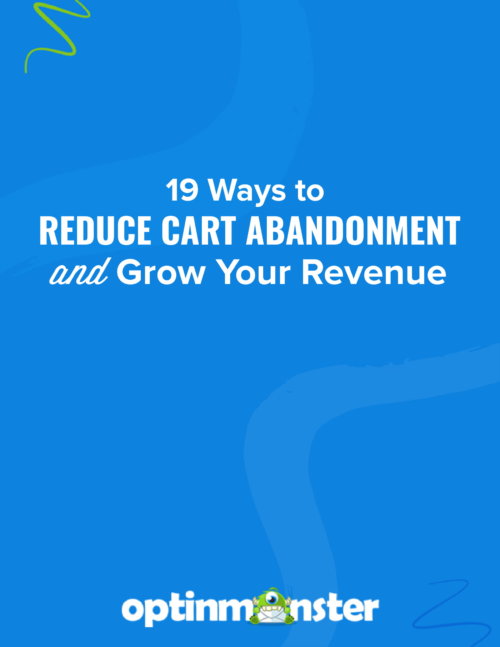



Add a Comment